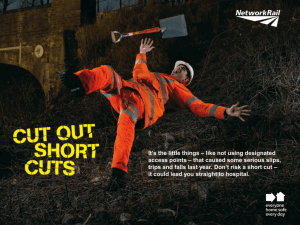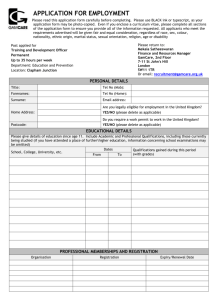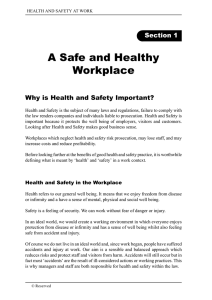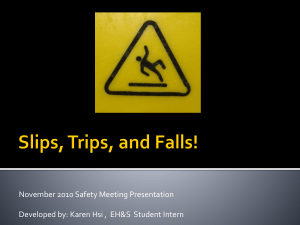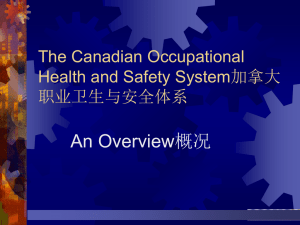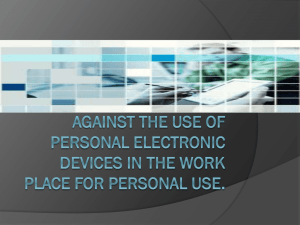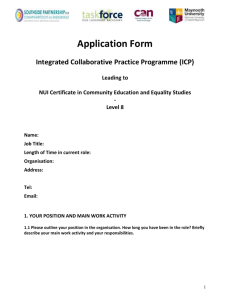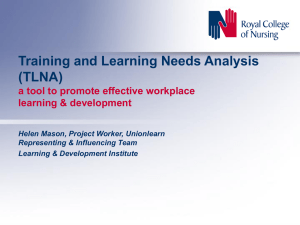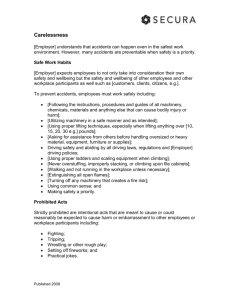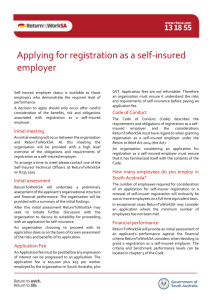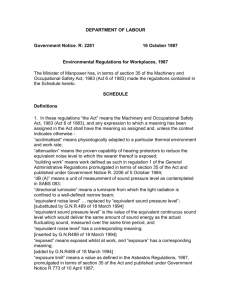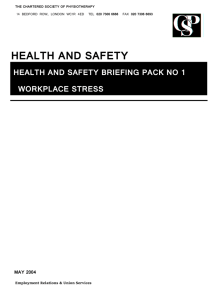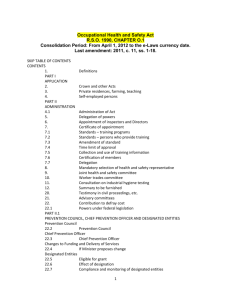All of the above
advertisement
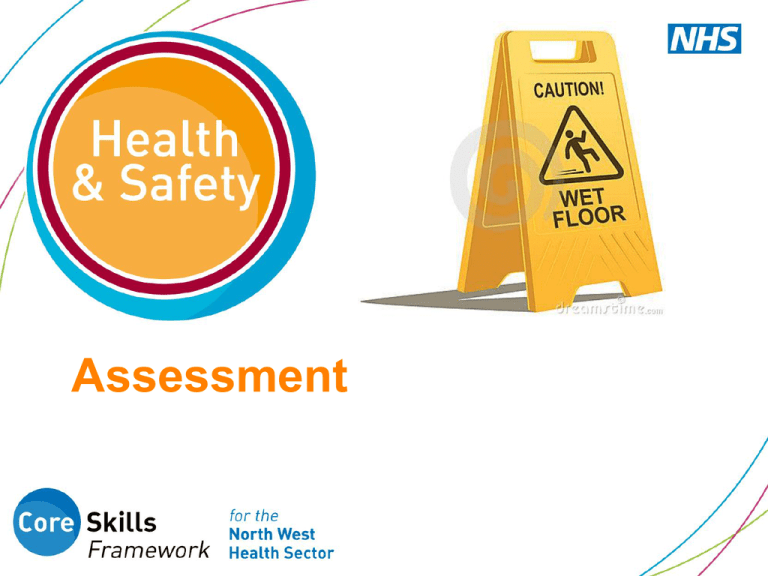
Assessment 1. Health and Safety at Work Law states which of the following: 1. 2. 3. 4. 100% You have a right to a safe workplace Your employer must keep you safe at work You also have responsibility for your safety All of the above 0% 1 0% 0% 2 3 4 Correct Answer is 4 – all of the above Health and Safety at Work Law is there to help, support and protect people in the workplace and not to make things unnecessarily difficult. The main pieces of relevant legislation are the Health and Safety at Work Act etc. 1974, and Management of Health and Safety at Work Regulations (1999) 2. It shall be the duty of every employer to ensure, so far as is reasonably practicable, the health, safety and welfare at work of all their employees 92% 1. 2. True False 8% 1 2 Correct Answer is 1 - True The notion of Reasonably Practicable means that the cost of any measure should be proportionate to the risk. This means that employer’s have to take action to control the health and safety risks in your workplace except where the cost (in terms of time and effort as well as money) of doing so is "grossly disproportionate" to the reduction in the risk. 3. A risk that needs to have action taken to control the health and safety hazard in the workplace is defined as : 82% 1. 2. 3. An acceptable risk A significant risk An insignificant risk 18% 0% 1 2 3 Correct Answer is 2 - Significant risk Risks, which are significant, are those that are not trivial in nature and are capable of creating a real risk to health and safety which any reasonable person would appreciate and would take steps to guard against. What can be considered as "insignificant" will vary from organisation to organisation, site to site and activity to activity depending on specific circumstances. The term "acceptable risk" describes the likelihood of an event whose probability of occurrence is small, whose consequences are so slight, or whose benefits (perceived or real) are so great, that individuals or groups in society are willing to take or be subjected to the risk that the event might occur. Absolute safety is generally an unachievable goal. 4. What is the most common cause of accidents at work? 58% 1. 2. 3. 4. Carelessly discarded needles Slips, trips and falls Lifting heavy objects Untreated ice in public outside spaces 42% 0% 1 0% 2 3 4 Correct Answer is 2 - slips, trips and falls 2 out of every 3 accidents are caused by simply slip, trips or falls. However, all of these can cause accidents and need to be attended to. 5. Failure to comply with Health & Safety legislation may result in which of the following? 100% 1. 2. 3. 4. The employer or an individual employee could be prosecuted The individual affected may claim compensation There could be a significant risk to the employer and the employee’s reputation and credibility All of the above 0% 1 0% 0% 2 3 4 Correct Answer is 4 – All of the above Failure to comply with Health and Safety law can have serious consequences – for both organisations and individuals. Sanctions include fines, imprisonment and disqualification. Case examples can be found at http://www.hse.gov.uk/ 6. Which of the following are potential hazards for slips, trips and falls? 100% 1. 2. 3. 4. 5. Spilt coffee on the floor Unsecured computer cables Loose floor tiles A messy workstation All of the above 0% 1 0% 2 0% 0% 3 4 5 Correct Answer is 5 - All of the above The answer is (of course) that all of them present a possible hazard and should be cleaned, fixed or reported 7. Who is responsible for health and safety? 1. 2. 3. 4. 5. The Chief Executive A Health & Safety Officer A Section Manager Individual Employees All of the above 100% 0% 1 0% 2 0% 0% 3 4 5 Correct Answer is 5 – all of the above Everyone has responsibility for health and safety, although the nature of that responsibility will be different for different people. 8. Staff should conduct a mental check or risk assessment when they… 1. 2. 3. 4. Go into a new working environment Are about to start a new task Change the way a task is usually done All of the above 100% 0% 1 0% 0% 2 3 4 Correct Answer is 4 – all of the above A risk assessment is simply a careful examination of what, in your work, could cause harm to people, so that you can weigh up whether you have taken enough precautions or should do more to prevent harm. 9. Incident reporting is: 1. 2. 3. 4. A way of showing managers all the accidents that occur A useful way for the organisation to assess its health and safety record Unnecessary bureaucracy Only of relevance to management 100% 0% 1 0% 2 3 0% 4 Correct Answer is 2 - a useful way for the organisation to assess its health and safety record Analysing reporting data can help the organisation to review its health and safety processes and procedures. As such, it is of value to everyone who works in the institution. It may seem like a nuisance to have to record accidents, but remember – if you don't, who will? 10. As an employee you have a responsibility under health and safety law to: 1. 2. 3. 4. 5. Take care of the health and safety of themselves and others Co-operate with others to help comply with health and safety legislation Follow any instructions and training you give regarding the measures in place to control health and safety risks Be aware of work situations that present a serious and imminent risk All of the above 100% 0% 1 0% 2 3 Correct Answer is 5 – all of the above Employee’s responsibilities The Law says that “no person shall intentionally or recklessly interfere with or misuse anything provided in the interests of health, safety or welfare” Employee’s have • Responsibility for self and others by acts or omissions • A responsibility to co-operate with employer • Follow policies, procedures and instructions THANK YOU End of the assessment Delegate Scores 10 Sandra Keri COSTALL 8 Emma Kathryn BAILY 10 Marion BEATTIE 7 Participant 7150C 10 Elizabeth ROBINSON 1 Participant 713E9 10 Grace Elizabeth MCGRATH 10 Emma Louise WILLIAMS 9 Holly Anne BARTLE 9 Jessica Louise JONES 9 Robin Dean LEE 9 Phil STUART 9 Siobhan WILLIAMS
